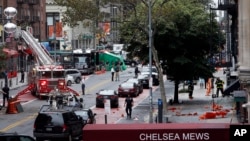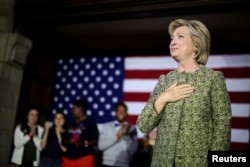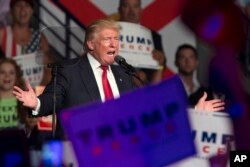Bombs in New York and New Jersey became a point of contention in the U.S. presidential contest and prompted calls for action Monday on Capitol Hill.
Democratic presidential nominee Hillary Clinton said she wants a new "intelligence surge" to fight terrorism. She said experts in America's Silicon Valley technology hub could help devise ways to monitor Internet conversations among plotters and prevent "attacks before they occur."
"Let us be vigilant, but not afraid," Clinton told reporters in New York.
The technological challenge was emphasized by a member of the Senate Intelligence Committee who told VOA that U.S. law enforcement and intelligence agencies are "blind" to self-radicalized terrorists who have carried out lone wolf attacks on American soil.
"It is extraordinarily difficult for our law enforcement and intelligence agencies to identify people who are at risk of radicalization, particularly in a world where they no longer need to travel in order to become radicalized," said Republican Senator Susan Collins of Maine.
"They can become radicalized through the internet. And with the tech community increasingly developing applications that are encrypted, even when there is suspicion that an individual is undergoing radicalization and may pose a threat to our country, our law enforcement officials are blind to what is happening," Collins said.
The senator spoke out after the arrest of a bombing suspect in New Jersey and, separately, a stabbing rampage in a Minnesota shopping mall in which the knife-wielding attacker was shot dead.
Trump’s response
On the presidential campaign trail, Republican nominee Donald Trump once again urged tightening immigration standards for people entering the United States.
Referring to those who have perpetrated terrorist attacks in the United States, Trump said, "Hillary Clinton wants to allow hundreds of thousands of these same people" into the country.
Trump said U.S. police know who "a lot of these people are" but "are afraid to do anything" to stop attacks because they do not want to be accused of racial profiling.
Clinton pledged that she, too, wants "tough vetting," but said the county is "well equipped" to meet the challenge of keeping out would-be terrorists.
"And we can do so with keeping smart law enforcement, good intelligence, and in concert with our values," she said.
Pressure from Capitol Hill
On Capitol Hill, the weekend attacks prompted renewed calls for action.
The Senate's top Democrat, Minority Leader Harry Reid of Nevada, has long advocated banning those on the government's terror watch list from purchasing firearms.
"Congress must do more to prevent these acts of terrorism altogether," Reid said in floor remarks Monday. "Right now as we speak, there is a loophole in our law that allows potential FBI terror suspects to legally purchase guns and explosives. Stop and think about that."
Republican Senator John Cornyn of Texas, meanwhile, called on President Barack Obama to sign a bill passed by Congress allowing Americans to sue foreign entities that sponsor terrorist attacks on U.S. soil.
"It [the bill] stands for the proposition that Americans should have recourse against those involved in terrorist attacks on our homeland," Cornyn said. "You would think that that would not be particularly controversial."
Collins, meanwhile, urged greater engagement with America's Muslim community.
"For our country to be attacked that many times in a 36-hour period is a call for action," she said. "We need members and leaders of the Muslim community to step up and cooperate more fully with law enforcement, and also to provide a counter-narrative to those young people who, for whatever reason, have fallen under the sway of radical Islamic extremist groups."
VOA’s Michael Bowman contributed to this report.








